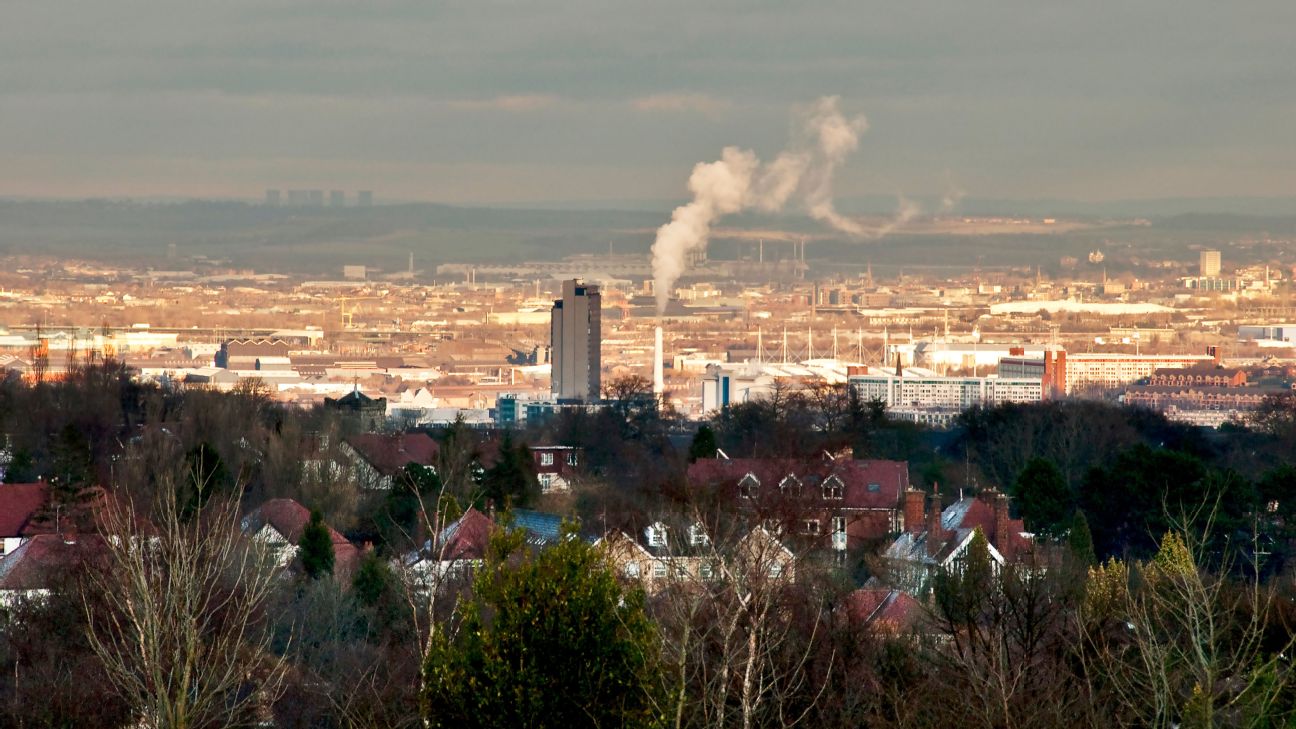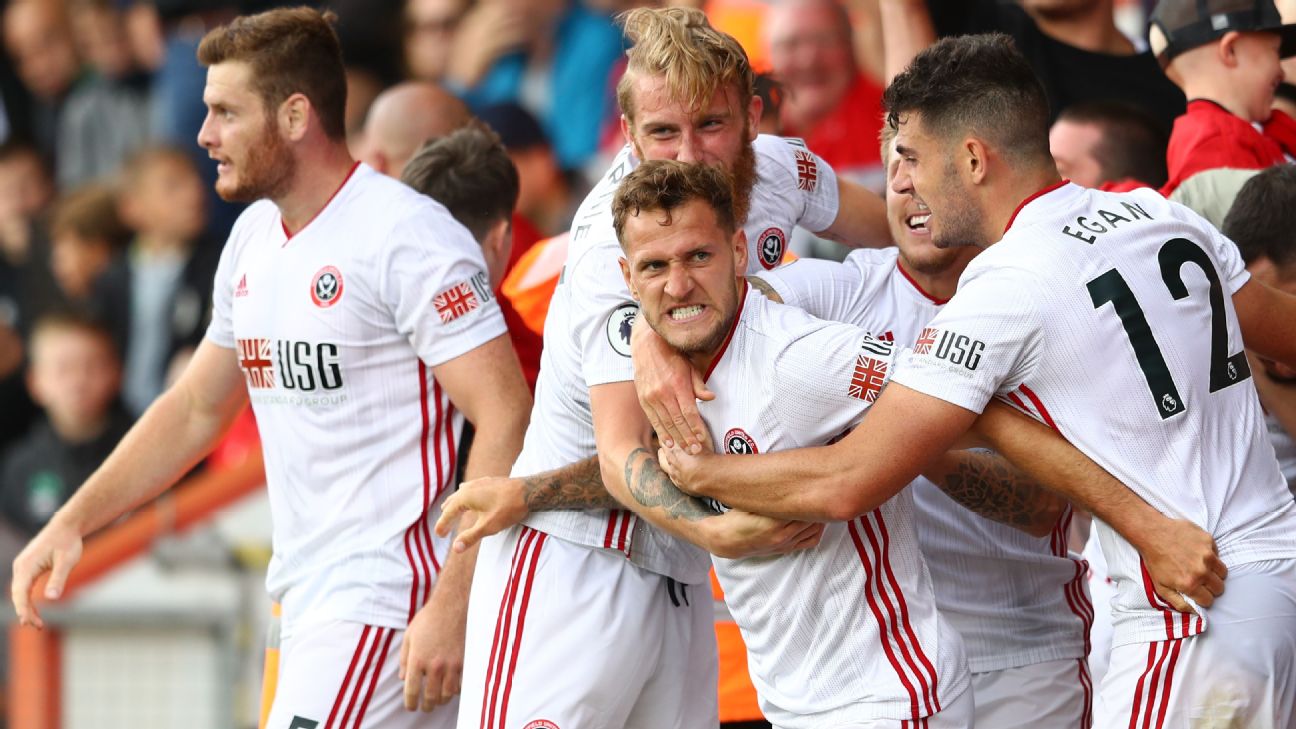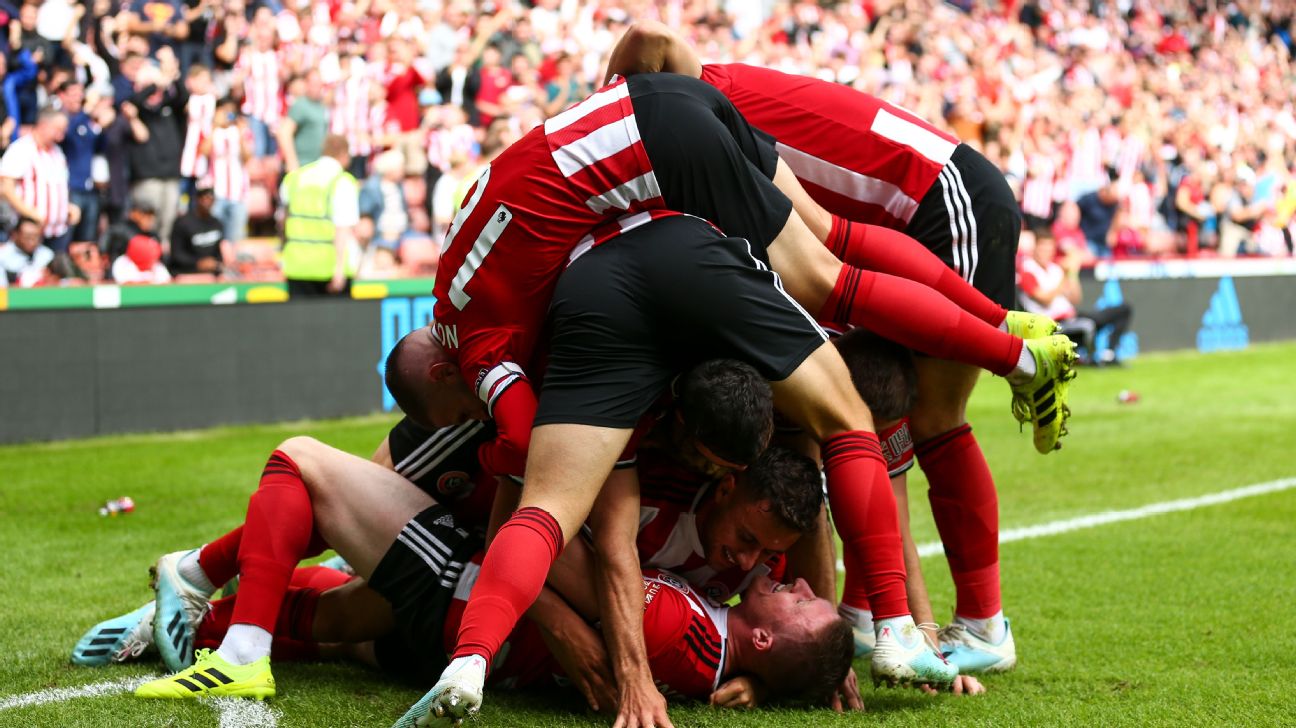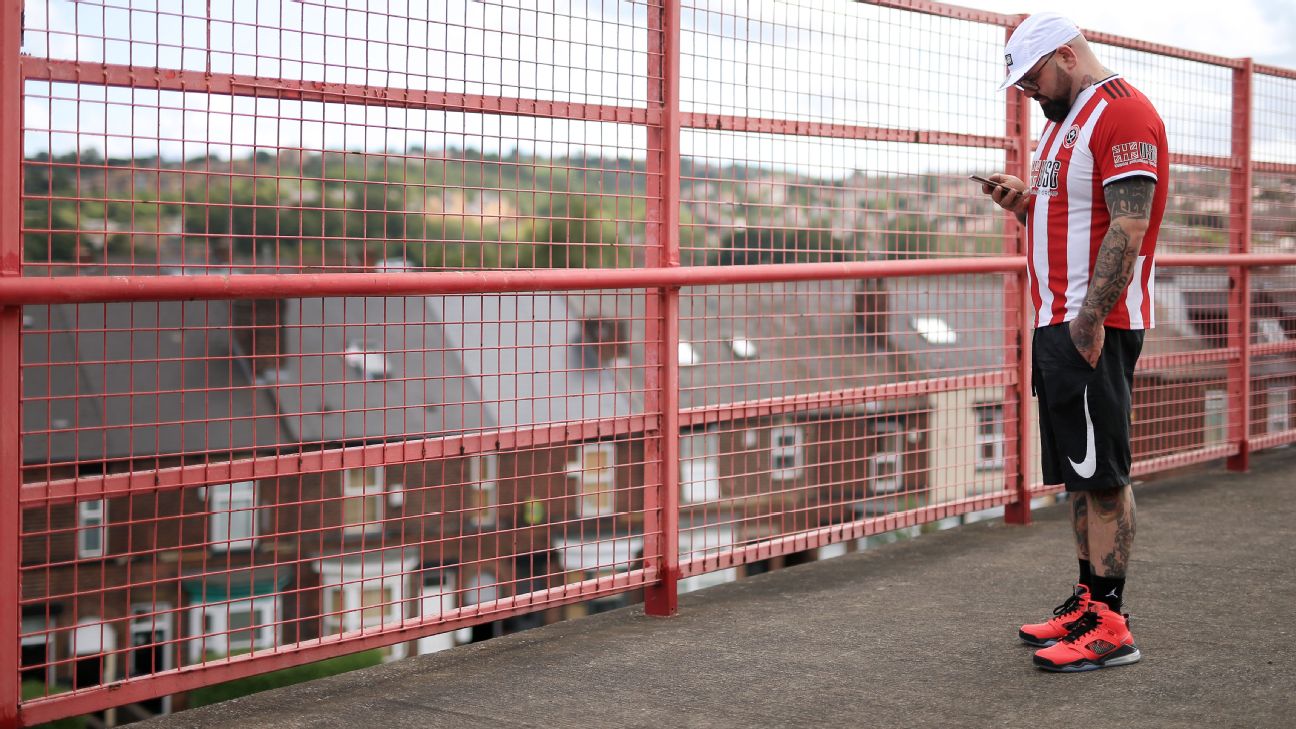
SHEFFIELD, ENGLAND — Bramall Lane, home of Sheffield United and the oldest field for professional football in the world, is far from a palace. It’s not a temple, either. It’s not a cathedral or a theater or another gleaming monument to the modern corporate game. Since ground was first broken here for sport in 1855 — and local hearts for many of the bleak years after — it has remained what it always has been: a factory.
Freshly promoted to the Premier League, United had to pour £5 million into their ancient ground to meet the requirements of their posher new peers, accustomed to glass houses: new floodlights, new press room, new TV studios. “We’ve tidied it up a bit,” Chris Wilder, United’s plain-spoken manager, said with a smile before the first top-flight match at Bramall Lane, or anywhere else in Sheffield, since 2007.
But the home of the Blades is still sheathed with brick and corrugated steel, protected from the rain by willpower and coats of red paint. It still sits among terraced houses and working-class merchants, Star Electrical Supplies and R. Mortimer & Son, French Polishers. It is still named for a family of metal tool manufacturers.
Bramall Lane is still glassless. It reflects nothing but defiance.

Crystal Palace, the first of United’s better class of visitors, arrived last Sunday afternoon in their polished black coach. By the stoic standards of South Yorkshire, the welcome was festive. Hawkers sold commemorative scarves and T-shirts that read Pride of Sheffield and Back in the Big Leagues. Banners flapped from the lampposts: We Are Premier League.
Even the sun was shining. Manchester City and the other United; Liverpool and Arsenal; Chelsea and Spurs — they are all on their way. The Blades are among the giants. That means Sheffield, the city, can stand with them, too. That was Sunday’s easy, feel-good narrative: Together, club and city have risen and returned, end of story.
Of course, Chris Wilder knows better. He was born in Sheffield in 1967 and grew up to play for his boyhood side during challenging times. “I don’t really want to talk about all that stuff,” he said. “Every football club has dark days.” Wilder thrilled in his restoration of better feelings since he became manager in 2016, in his lifting the Blades from League One to the Premier League in only three seasons. The euphoria ended even more quickly. By close to unanimous consent, Wilder’s club isn’t predicted just to be relegated this season. They’re doomed to finish dead last.
“Modern-day football isn’t emotional, is it?” Wilder said. “I do believe when standards rise, your standards rise. We’re realists as well. We understand what’s coming and what might happen. How do we overcome that? Of course, it’s a bear pit. It’s brutal.”
He paused, as though for the first time he wondered how he could ever account for the coming costs of his success, the balance he will have to find between a reverence for the past and the ruthlessness demanded by the future. He shrugged.
“But it’s the place to be,” he said.
In some ways, Bramall Lane is the last remnant of an otherwise vanished civilization. Like so many northern towns, Sheffield has been forced by time and the world to change what it is and how it sees itself.
The onetime global supplier of guns and bells and knives endured twin miseries in the 1970s and ’80s: Both of its defining industries, steel and coal, went into steep, unstoppable decline. In the midst of violent strikes and closures, tens of thousands of Sheffield’s proud residents were forced to flee. If rust had a kingdom, the Steel City had become its capital.
Sheffield’s pair of former football powers, Wednesday and United, decayed with it. They no longer offered escape; they became grim reminders of how things fall apart. Wednesday, older and more storied than United, haven’t played in the top flight for 19 seasons. The Blades — named for the cutlery that Sheffield no longer produces — have been mostly absent since 1976. Their last stay 12 years ago was measured in months. Bramall Lane has remained a factory, but it has made misery more than anything else.
This city nonetheless maintains a strange pride in the agents that betrayed it. United’s motto, “Forged in Steel,” could seem almost ironic during its losing years. To a visitor, Sheffield’s continued celebration of industry is like watching a friend never get over the lover who left, but there is also a palpable, opposing desire for reinvention. A hub for higher education, today’s Sheffield has a reputation for molding young minds instead of metal. Its former steelworks and warehouses have become offices and lofts; the last of its monstrous Bessemer converters has been turned into a magnificent museum piece. It has new pedestrian malls and public art. Now it also has top-flight football, and with it comes Chris Wilder’s conundrum. It’s a version of his city’s own dilemmas, the questions asked of everyone who needs or wants to be better.
Who were you? Who are you? And who will you choose to be?

Last year, United’s usual captain was local hero Billy Sharp. At 33, he had waited a very long time for his first significant taste of the Premier League — often lost in the lower leagues despite his touch for goal — and he was a principal reason the Blades would now have it. Headed to their opening match, away against Bournemouth on Aug. 18, there was speculation whether he would start. United had signed 10 new players over the summer, including Callum Robinson and Oli McBurnie, spending a combined £45 million and breaking the club record for a single transfer fee four times. There was only so much room on the pitch.
Wilder said what a man in his position is expected to say. He insisted that there was no place for sentiment in his decisions. Nostalgia never conquers new ground. United needed the points. He would go with his best 11 men.
Still, nobody really believed that he wouldn’t start Billy Sharp.
He did not start Billy Sharp. His former captain came on as a substitute. Angered and perhaps inspired by the snub, he scored in the 88th minute to earn a 1-1 draw against the Cherries. The ecstatic celebration in the away end — “absolute carnage,” Wilder called it — soon gave way to dressing-room glares and an awkward, stony silence.
Is this who you’re choosing to be?

It’s the best football in the world, but it’s still a game with heart at its center. For every Billy Sharp left on the bench, there is an Ollie Norwood brought into the brightest, warmest light, a hard-luck case finally come through.
Norwood, a small, shyly spoken midfielder, was a long-term product of Manchester United’s academy. In 2012, when Sir Alex Ferguson told him that there would never be a spot for him at Old Trafford, his farewell ended with an encouraging word: Norwood would no doubt play with the best for another club. He was 21.
He came close twice before this season. First he helped Brighton to promotion, but he was loaned out to make room for new signings. The same happened the next year with Fulham: Norwood was up, and then he was out.
Despite becoming a stalwart at Sheffield United last season, he spent his summer worried whether again he would be found not quite good enough. Wilder had told Norwood during the promotion celebrations that he need not worry. “I didn’t know if he meant it,” Norwood said, “because we were drunk at the time.”
Wilder did mean it. In the first week at Bournemouth, Norwood, now 28, put on the captain’s armband before he ran onto the pitch as though on air.
“It’s taken a bit longer than I would have liked,” he said after. “But it was a dream come true.”

Dreaming might be the most mysterious thing we do to ourselves, a gift and a curse. Dreams come from within us, so they are ours and ours alone, but they happen to us. We don’t always invite their presence, and yet there they are, delivered by one part of our minds to another. Some of them are magical. In them, we can perform feats of strength that we never could in reality. In dreams, we can fly. We can be young again. The dead can come back to life. Dreams can also become nightmares. Sometimes dreams wound us. Some dreams scar.
Sharp didn’t start at home against Crystal Palace. He didn’t play a single minute of the game of his life. Robinson did. So did McBurnie and Norwood. In front of more than 30,000 of the loudest supporters on earth, United played a nearly perfect old-school game. They held close the simple beliefs that have been instilled in them since they were children. Hard passes. Harder tackles. Pressure. Don’t wait for the ball. First to it. Effort beats talent. Desire overcomes privilege.
Normally these are the lies we tell ourselves before we’re supposed to lose. This time heart really did win. John Lundstram scored a sitter in the 47th minute, and then ran to a corner of the pitch, where he soon found himself at the bottom of a pile of his ecstatic teammates, Norwood on top, shaking both of his fists at the mad, frothing crowd. The Blades hung on for what felt like forever, seven minutes of added time especially, for the 1-0 victory.
At game’s end, it was announced to the departing faithful that Sheffield United sat eighth in all of England, albeit after two games. Not long ago, that would have seemed an impossible height. “Can you imagine what would happen if we finished in the top 10?” one United staffer dared to wonder aloud.
“Don’t be silly,” another shot back.
Some dreams are private. Some dreams are infectious. Some dreams disappear as soon as they are realized. Some dreams feel so real they become memories.
There is a striking collection of poems, cast in metal, mounted on the sides of tall buildings across Sheffield. One, by Andrew Motion, greets visitors after they step out of the train station. It welcomes them to “a priming-place which lifts you off” and “the city where dreams are re-paid.” Another, by Pulp frontman Jarvis Cocker, graces the side of a student dormitory named, predictably, The Forge. It implores its residents not to use the city and leave but to become part of it and stay:
Within these walls the future may be being forged
Or maybe Jez is getting trashed on cider
But when you melt you become the shape of your surroundings:
Your horizons become wider.
It’s pretty to think and too simplistic to trust that Sheffield’s problems — and United’s — have been solved. Undeniable progress has been made. But the city center still gets sinister at night; sides like Blackpool and Huddersfield Town never stay up for long. The challenges of modern economies, football’s included, are limitless. There are only so many ways to overcome them, and those counters aren’t available to everyone.
Nobody knows what will become of this old city or its football clubs. Nobody knows for what they will one day be known. It would have taken some considerable talents for future reading to have forecast this mixed present. The mighty blast furnaces have gone cold. In exchange, there are clearer skies.
After their win against Palace, the Blades of Bramall Lane clocked out to end their shift. They exited from the back of the stands and entered the arms of their happy supporters and the last of a golden light. The We Are Premier League banners flapped over their heads for another day. Those days are possibly numbered. This one definitely felt blessed.
The bigger clubs live their lives like pearls, hidden inside shells; Arsenal stay in a hotel the night before even matches at home. Not Sheffield United. They walked outside, many with wives and small children in tow, and felt the clapping hands of strangers on their backs. Billy Sharp and his family folded their stroller into their SUV and slowly slipped away. Ollie Norwood and Callum Robinson made instead for the hotel on the corner, where the crowd in the lobby bar greeted them with cheers and raised glasses.
Their only fear was the future. Their best armor looked to be love.
